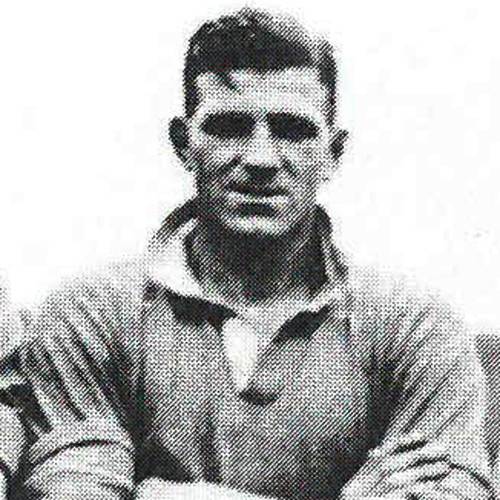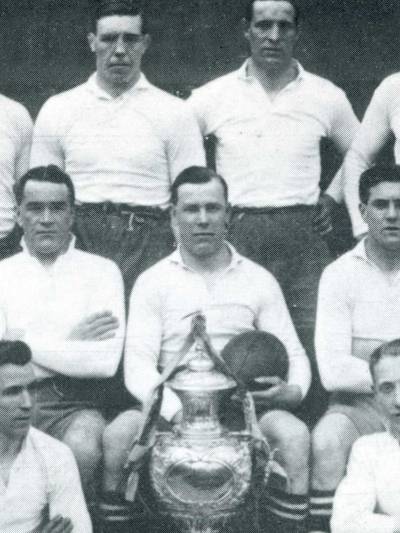
Legend:
Alf Watson
- Position: Second Row
- Heritage number: 569
- Honours: England
Debut: Vs Hunslet 13th November 1937
Honours: Challenge Cup (Finalist: 1947)
When he signed for Leeds in November 1937, much was expected of 20-year-old loose-forward Alf Watson. The deal was an exchange one, taking Loiners’ reserve stand-off Johnny Jones to Belle Vue, along with a cheque for ‘a fairly substantial sum.’
Reports in the local press at the time said, ‘The players are two of the most promising young men in the League and for each a distinguished future has been prophesised.’ Watson made his debut the day after his arrival, in an 8-5 home defeat in the derby with Hunslet and the following week, at Salford, his display was deemed to be the best in the position since Frank Gallagher, scoring the first of five tries that season in the return 26-2 Headingley triumph over the Red Devils on December 28th, Leeds and Wakefield having drawn nil-nil on Christmas Day.
Suspension ruled him out of the All-Leeds Championship final at Elland Road in April 1938 but such was his continued good form, he was selected for Yorkshire and England in Wales and had been earmarked for the 1940 Lions tour until War intervened. One of his best displays was the last before active service, a 27-17 defeat at Huddersfield where he scored and ran superbly, on 27April 1940. He was only allowed to play as he was stationed in the town and was due to leave on military duty that night.
Watson was a member of the Duke of Wellington’s Regiment as a Lance-Corporal and was reported as missing in action on 11 June 1940 as France fell, but was taken back to Germany as a prisoner of war and to work on a farm. Even when in camp he kept his ties going, helping to arrange two ‘Test’ matches against Australian prisoners and sending a letter back to the club saying, ‘I know you are inquiring for players after the war. We have an outstanding man here and he is interested. His height is 5ft. 11 ½in. he weighs 12st. he is fast enough to do 11 seconds for the 100 yards and he looks good in the right centre position. He would be pleased if you would drop a line making some arrangements with him.’ When Leeds faced Wakefield in 1941, a collection was made to contribute to a parcel fund for him which, when made up, included a set of boots.
Released in June 1945, for the final few months he had been forced to march across Germany as the Russians attacked, telling his team mates as he returned for training in the August: “We were on the march from January 23 to May 24. On only nine days in that time did we rest, and we did the best part of 25 kilometres every day. We slept in the snow in fields and barns and ate what we could find, our boots had collapsed and we were on bare feet. I kept myself as fit as I could, thinking always of the time when I should be able to play for Leeds again.”
Initially hospitalised when he arrived back at barely nine stone and with badly swollen ankles, he was in the side that lost 36-5 on the opening day of the 1945-6 season at Wigan and, along with Reg Wheatley who had been similarly incarcerated, received massive cheers when donning the kit again at home the following week. He also played in the makeshift Leeds side that suffered a record 71-0 defeat at Wakefield, one of only four men in the team who had appeared before the hostilities. Sadly, he was suffering from what would now be termed post-traumatic stress syndrome and battled with alcohol on his immediate return, soon after pleading guilty to indecent exposure, being bound over for 12 months and fined 26 shillings for costs.
Such was his form, though, he was a regular in the side for the next two seasons, his best 1946-47 when he scored 10 times, including three in four games in November 1946 and doubles in big wins against Wakefield on Boxing Day and Hunslet on the last day of the season, in what proved to be his final of 149 appearances which yielded 29 tries. He was superb as Leeds got to Wembley without conceding a point, playing alongside Arthur Clues in the Cup final, an 8-4 defeat to Bradford.
Soon after, he was fined 40 shillings at Dewsbury for taking possession of a stray dog in Heckmondwike and not reporting it, the mutt belonging to the licensee of the Commercial Hotel who had seen it at Watson’s home and did not believe he had bought it from a man for 5 shillings as claimed.
During the close season, Watson suffered a severe spinal injury in a charity match which caused him to be admitted to Pinderfields hospital for several weeks. In mid-November 1947, he attempted a comeback in the ‘A’ team against Halifax at Headingley but, late in the game, suffered a reoccurrence of his back problem, was carried off and re-admitted to Pinderfields.
In June 1948, aged 30 and living in Sandal, he was charged with attempting to take a Rolls Royce from Parkinson’s, a firm of Wakefield funeral directors, without their consent but in January ‘49 won his appeal when it was pointed out that he had never driven a car, did not have a licence and could not have fled the scene as he could not run owing to his injury.
He was given a free transfer by Leeds and, in March 1949, joined Featherstone and made three appearances for Rovers before insurance difficulties arose.












































